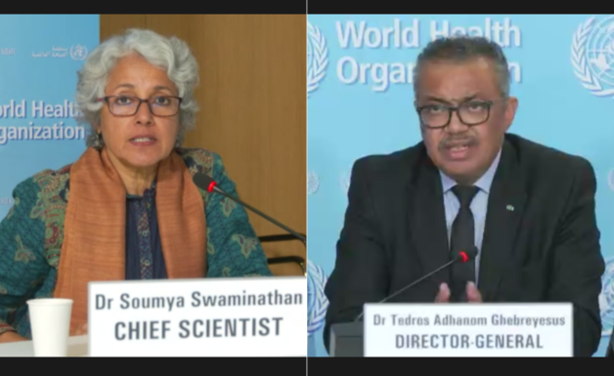
Dr. Soumya Swaminathan, Chief Scientist at the World Health Organization, and WHO Director-General, Tedros Adhanom Ghebreyesus, speaking during a media briefing in Geneva on October 5, 2022 [screen shot]
At an October 5 media briefing from Geneva, the UN World Health Organization's Dr @mariangelasimao announced "good news" for the global fight against Covid-19 and other diseases that can be prevented or reduced in severity by vaccines. South Africa's National Regulatory Authority has become Africa's fifth country, alongside Tanzania, Ghana, Nigeria and Egypt, to become an "ML3 regulatory authority for vaccines". The designation, earned after extensive reviews by international experts and following new protocols suggested by earlier evaluations, means South Africa has achieved a WHO ranking "to ensure safety, quality and effectiveness" of vaccines it produces.
"We cannot talk about better health care without quality medical supplies," said Dr Matshidiso Moeti, WHO Regional Director for Africa. "This is an important new step not only for South Africa, but for the region towards self-sufficiency in vaccines and medicines."
"This rapid progress on vaccines regulation is a significant milestone for South Africa, the Southern African region and the continent. It is an important win for vaccine equity, as the country is a major manufacturer of medical products and ... will help maximise the impact of the mRNA vaccine technology hub," said Dr Tedros Adhanom Ghebreyesus, WHO Director-General.
At the same briefing, WHO Chief Scientist @doctorsoumya Swaminathan said that teams from around the world are already going to South Africa for training on various aspects of preventing and managing infectitious diseases. She also lamented the global drop in sequencing and sharing genomes of Covid-19 variants, hindering the possibiity of knowing what new threats are arising. African scientists are helping to compensate for that gap.
The co-author of a study published in Science recounts how African researchers sequenced 100,000 genomes to track Covid's evolution and alert the rest of the world. Quoted in Nature magazine on October 3, the sequencing effort shows that "African scientists can work together to produce high-level science," said co-author Tulio de Oliveira, a bioinformatician at Stellenbosch University in South Africa. "Before, it was almost the norm that African scientists would work with a northern partner to produce that kind of level of science."

Dr. Soumya Swaminathan, Chief Scientist at the World Health Organization, and WHO Director-General, Tedros Adhanom Ghebreyesus, speaking during a media briefing in Geneva on October 5, 2022 [screen shot]
AllAfrica publishes around 400 reports a day from more than 100 news organizations and over 500 other institutions and individuals, representing a diversity of positions on every topic. We publish news and views ranging from vigorous opponents of governments to government publications and spokespersons. Publishers named above each report are responsible for their own content, which AllAfrica does not have the legal right to edit or correct.
Articles and commentaries that identify allAfrica.com as the publisher are produced or commissioned by AllAfrica. To address comments or complaints, please Contact us.